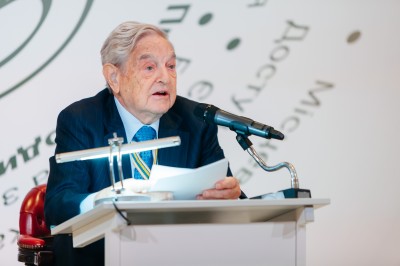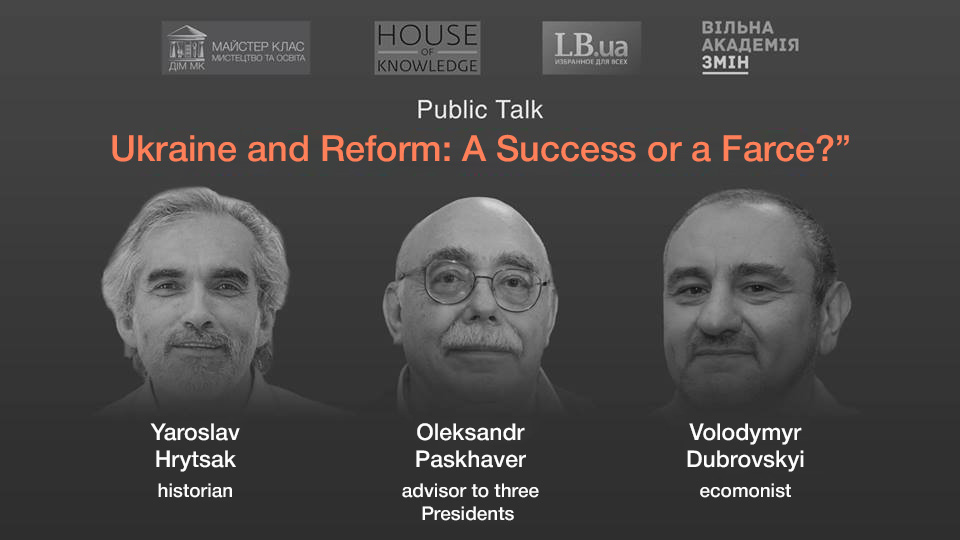The new Ukraine aspires to be the exact opposite of the old Ukraine. In the old Ukraine the economy was dominated by oligarchs and a civil service that exploited the people rather than serving them. Freedoms granted by Ukraine’s national independence did not guarantee basic human rights. Freedom of speech was confined by censorship and “temniki” and civil society activists faced real dangers.
The new Ukraine is determined to undertake radical and painful political and economic reforms that will correct these defects. To be realistic, that is a noble objective but not an attainable one. Psychoanalysts have a technical term, they call it “a fantastic object”, an ideal that inspires people but reality can never live up to it.
The new Ukraine grew out of many years of civic activism that the foundation did support, and it was finally brought into existence by the heroic defenders of the Maidan who were willing to sacrifice their lives for a better future for their country.
Contrary to what the Russian propaganda machine says, the foundation did not finance Maidan, although it did provide legal and medical assistance to the people who were fighting there and then sought to keep the spirit of Maidan alive by converting a revolution into a constructive, nation building activity – and that is the source of my pride and joy.
I have been intimately involved in Ukraine ever since it became independent. Indeed, I established the foundation even earlier, when it was still part of the Soviet Union in 1990. Legally, the IRF was set up as the Ukrainian branch of my Russian foundation, the Cultural Initiative, that was established under the patronage of Mikhail Gorbachev’s wife, Raisa in 1987. In 1991, the foundation was re-registered as an Ukrainian entity, the International Renaissance Foundation.
Neither the foundation nor I personally feel any hostility towards the Russian people; we are opposed to the Putin regime which is exploiting the Russian people in the same way as the Yanukovych regime was exploiting the people of Ukraine.
I remember the day of my first visit to Kyiv in 1990. It was a national holiday, celebrating the famous Ukrainian poet, Taras Shevchenko. All the leaders of civil society were there and when I announced that I wanted to set up a Ukrainian foundation they all came up with their own suggestions. I found something wrong with each one of them until I felt obliged to apologize for being so critical.
This drew a surprising response “You don’t realize how refreshing it is to meet someone so honest. Usually we meet officials who listen to our concerns and make promises but don’t do anything. Perhaps you will really do something.” This made a big impression on me. I stopped feeling embarrassed about saying no and that remains true today.
After Ukraine became independent, I visited the country often enough to get to know practically all the political and cultural leaders, many of whom are still around. Almost every time I came, I found myself in the middle of a political or economic crisis which goes to show that crises have been the rule rather than the exception in Ukraine. Today is no different.
I don’t want to repeat everything I have said and written about the new Ukraine because I want to concentrate on the future. As I like to joke, I only remember the future.
I proposed what I called a “winning strategy” for Ukraine late last year and kept updating it. I used to emphasize how narrow and winding the path to success is. Before my current trip to Ukraine, I thought that I can be more optimistic. The first condition for success, an enduring ceasefire is almost attained, and the second, the availability of adequate financial resources, is very well marked out.
Just to remind you, it involves the Macro-Financial Assistance program, which has already been used by the European Commission to finance its contribution to the IMF program. That would open the way to the crucial step: a wholehearted commitment by the European Union to help Ukraine not to just survive but to flourish and become an attractive investment destination. The new date for announcing that commitment is the end of January 2016, when the existing sanctions against Russia expire.
Again, to remind you, the key point of my strategy is that the sanctions against Russia have to be matched by a wholehearted commitment to Ukraine. Sanctions are a necessary evil: necessary because Russia cannot be allowed to replace the rule of law with the rule of force; evil because sanctions hurt everyone – both those on whom it’s imposed and, indirectly, also those who impose them.
Putin has developed a very effective narrative to defend himself against the sanctions. He claims that all of Russia’s economic and political difficulties are due to the hostility of the Western powers, who want to deny Russia its rightful place in the world. Russia is the victim of their aggression.
Putin’s argument appeals to the patriotism of Russian citizens, and asks them to put up with the hardships that the sanctions cause. The hardships—which include financial instability and shortages—actually reinforce his argument. The only way to prove Putin wrong is by establishing a better balance between sanctions against Russia and large-scale support for Ukraine.
Unfortunately, the people and leadership of Europe are preoccupied with other problems, the refugee crisis and the wave of terrorist attacks in Paris foremost among them. As a firm believer in the original concept that led to the formation of the European Union, I share their concerns. My foundations and I personally are as deeply involved in helping the refugees as we are in helping the new Ukraine.
We have developed a comprehensive asylum policy for the European Union which is under active consideration by the authorities. So, I am in a strong position to remind the European public and leadership of the importance of the new Ukraine and tonight is a good occasion to do so. Europe is badly in need of a success and Ukraine can provide one. The mere fact that the new Ukraine has survived against overwhelming odds counts as an accomplishment.
Looking at the larger picture, a return to hybrid warfare did not yield Russia significant additional territorial gains. Oil prices did not recover from the nosedive they took at the end of 2014 and the sanctions against Russia began to bite. The lack of financing prevented the development of new oilfields and the lack of spare parts started to affect production from the existing oilfields.
For the first time in many years, both the quantity and quality of output declined between the two peak months of June and July of this year. Putin gradually came to the conclusion that he had not enough to gain in Ukraine to offset the gradual erosion that was bound to occur at home. This development deserves to be recognized as a victory for the new Ukraine.
I have been in Ukraine for only a week but I came to realize that the situation is not as promising as I had thought from the outside. The new Ukraine performed miraculously when it was unified by an outside threat, Putin’s implacable hostility. Now that Putin is preoccupied with Syria, that danger has diminished. After years of hardship and sacrifice, people are eager to relax and pursue their personal or political interests.
This is opening up fault lines that were previously held together by the pressure emanating from Russia. I see a real possibility that the objective that Putin could not achieve by military means may fall into his lap as a result of a lasting ceasefire.
This brings me to the situation I found when I arrived in Ukraine. The electorate voted very maturely in the first round of the local elections. In effect, the voters endorsed the ruling coalition yet they made it clear that they were dissatisfied both with their living conditions and the pace of reforms. Their endorsement has the character of a payment in advance. It is now up to the ruling coalition to live up to the expectations of the public—and that is where the problems lie.
The ruling coalition has very little choice. The country cannot afford either fresh national elections or a change of the coalition. Both would disrupt the government for several months and the country faces a fiscal emergency. It has not met the conditions imposed by the IMF and it will not receive the next tranches until it does so.
Prime Minister Yatsenyuk has become very unpopular and his party did not participate in the local elections. Yet President Poroshenko cannot afford to replace him because of the large voting bloc Yatsenyuk controls.
The only way forward is for President Poroshenko to commit to continued cooperation with Yatsenyuk and jointly persuade their respective blocs to pass a budget that will satisfy the IMF. That is what they did at the beginning of 2015 and it worked. The trouble now is that the president has been reluctant to make that commitment and in the absence of his leadership the ruling coalition is in disarray. Legislation that needs to be passed is either not submitted or it is defeated in the Rada.
Time is running out. The sooner President Poroshenko commits himself to the only course that is open to him, the better the chances that he can regain control of the ruling coalition and avoid a fiscal calamity that could destroy the new Ukraine.
The president will need to take charge of the reform process for which the public is clamoring. As I said earlier, the electorate endorsed him in the local elections in the expectation that he will do so. He is the president of Ukraine. Both the people and the friends of the new Ukraine are looking to him for leadership. I am convinced that the moment he reaffirms his commitment to the new Ukraine the country will follow him.
In conclusion let me say a few words about the future of the foundation. The IRF has been so preoccupied with the future of Ukraine that it has not given much thought to its own future. I think the IRF has had the right priority. By putting the future of the country first, it has fulfilled my highest expectations. I and my foundation after my lifetime will continue to support the IRF for the indefinite future.
For instance, the Polish member of our network, the Stefan Batory Foundation, has amassed a large endowment from various foreign sources that assures its long-term existence. Do you want to build some kind of council or membership organization the way the Batory Foundation did? Do you want to raise funds from the public or from transparent businesspersons?
For the time being, any funds you raise must be immediately spent on programs, particularly for the Internally Displaced Persons. I think the IRF has had a glorious history and it has a vigorous presence in Ukraine today. It deserves a long-term future.
Long live the IRF!





